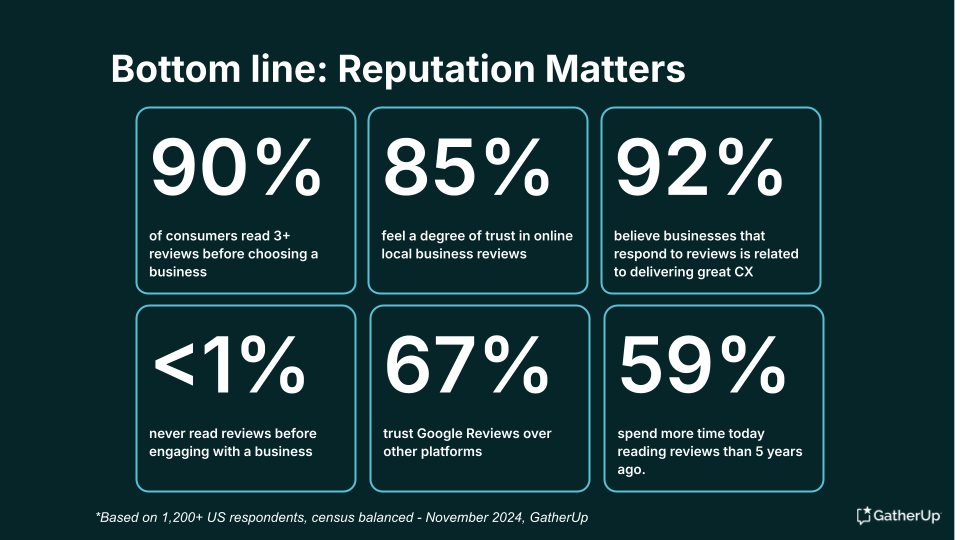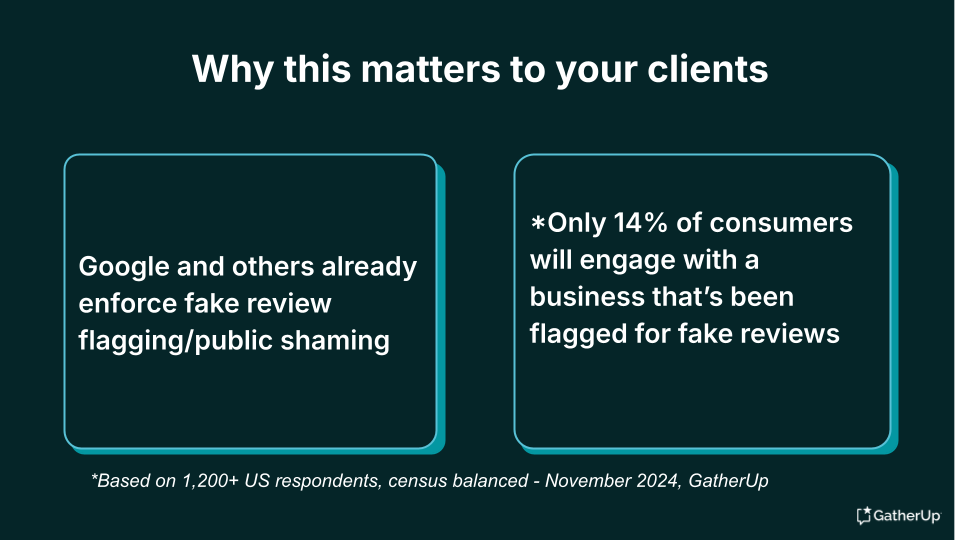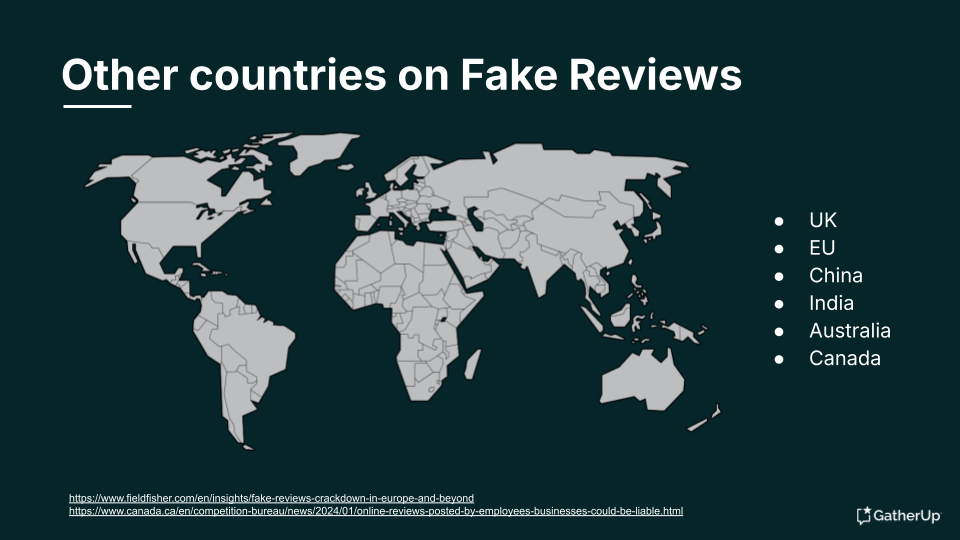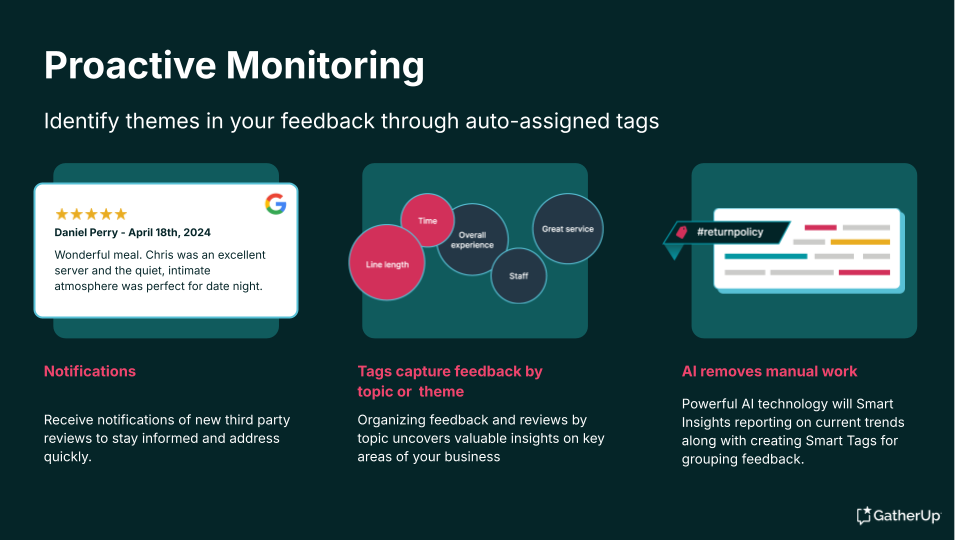- Why Reputation Management is the Key to Success for Digital Agencies in 2025 and Beyond
- The Global Movement Toward Trust and Authenticity
- Adapting to the New Rules: Challenges and Opportunities
- How Digital Agencies Can Take the Lead
- The Future of Reputation Management: A Foundational Strategy for Agencies
Online reviews have become an integral part of the buying process. In GatherUp’s upcoming research, surveying over 1,200 Americans in November 2024, we found that 97% of consumers rely on reviews before choosing a vendor or service provider. This staggering statistic reveals that reviews are now a cornerstone of the buyer’s journey. For digital agencies, this shift presents both a challenge and an opportunity: how to help clients thrive in this review-driven economy while staying compliant with emerging rules and regulations.
At the same time, digital agencies are facing growing headwinds in driving traffic and revenue for their clients. The cost of pay-per-click (PPC) advertising continues to rise. According to WordStream’s Google Ads Benchmarks 2024 report, the average cost-per-click (CPC) on Google Ads has increased by 10% year-over-year, while SparkToro reports that 60% of Google searches are now zero-click. These trends make it harder and more expensive than ever to generate leads and foot traffic for businesses.
Reputation management emerges as a solution to these dual challenges. By enhancing a business’s trust and credibility, a strong reputation boosts the effectiveness of every other marketing channel—from PPC to SEO—while improving conversion rates at the foundational level. For digital agencies, this isn’t just an added service; it’s an essential strategy to help clients succeed in an increasingly competitive landscape.
The FTC’s recent ruling underscores the urgency of adopting reputation management practices. These new regulations bring significant changes to how businesses must manage online reviews, with strict penalties for violations. Highlights of the ruling include prohibitions on:
 With these regulations now in effect, the old practices of review gating and selectively soliciting feedback are no longer viable. Agencies must guide their clients toward authentic, compliant reputation management strategies that build trust and withstand regulatory scrutiny. The stakes couldn’t be higher: beyond hefty fines, non-compliance risks eroding consumer trust and undermining a client’s ability to compete in today’s marketplace.
With these regulations now in effect, the old practices of review gating and selectively soliciting feedback are no longer viable. Agencies must guide their clients toward authentic, compliant reputation management strategies that build trust and withstand regulatory scrutiny. The stakes couldn’t be higher: beyond hefty fines, non-compliance risks eroding consumer trust and undermining a client’s ability to compete in today’s marketplace.




- Fake or false reviews: Reviews written by non-customers or fabricated entirely.
- Incentivized reviews: Offering rewards for positive reviews or misleadingly influencing review sentiment.
- Insider reviews and testimonials: Employees or close associates leaving reviews without clear disclosure.
- Company-controlled websites: Using fake reviews or suppressing negative feedback on owned platforms.
- Fake social media indicators: Purchasing likes, shares, or other signals to inflate perceived popularity.
- Review suppression: Selectively hiding or removing negative reviews to mislead consumers.
 With these regulations now in effect, the old practices of review gating and selectively soliciting feedback are no longer viable. Agencies must guide their clients toward authentic, compliant reputation management strategies that build trust and withstand regulatory scrutiny. The stakes couldn’t be higher: beyond hefty fines, non-compliance risks eroding consumer trust and undermining a client’s ability to compete in today’s marketplace.
With these regulations now in effect, the old practices of review gating and selectively soliciting feedback are no longer viable. Agencies must guide their clients toward authentic, compliant reputation management strategies that build trust and withstand regulatory scrutiny. The stakes couldn’t be higher: beyond hefty fines, non-compliance risks eroding consumer trust and undermining a client’s ability to compete in today’s marketplace.
Reputation Management: The Key to Unlocking Marketing Success
Online reviews are no longer a peripheral part of the consumer journey—they are often the very first touchpoint a potential customer has with a business. Reviews shape consumer perception, influence buying decisions, and directly impact a business’s ability to attract and retain customers. For digital agencies tasked with driving traffic, conversions, and revenue, ignoring reputation management is like building a skyscraper on unstable ground. Without a strong foundation of trust and credibility, even the best marketing campaigns can falter.The Numbers Speak for Themselves
The importance of reviews is reinforced by hard data:- 97% of consumers rely on reviews to make purchasing decisions.
- 59% of Americans spend more time reading reviews today than they did five years ago.
- 85% of consumers trust online reviews as much as personal recommendations.
- Fewer than 1% of Americans never check reviews before engaging with a business.

Why Reputation Management is a Game-Changer for Agencies
For digital agencies, incorporating reputation management into their offerings isn’t just about providing an extra service—it’s about unlocking the full potential of their existing strategies. Here’s how a strong reputation fuels marketing success:- Enhanced Conversion Rates Consumers are more likely to engage with businesses that have positive reviews. A business with a higher star rating and authentic customer feedback is far more likely to convert traffic into sales, maximizing the return on investment (ROI) for paid and organic campaigns.
- Amplified Trust and Credibility A well-managed reputation establishes trust, which is the foundation of customer relationships. Trust leads to better engagement rates, higher customer retention, and ultimately, more referrals and word-of-mouth marketing.
- Better SEO Performance Google places significant weight on reviews for local search rankings. Businesses with frequent, high-quality reviews are more likely to appear in the local pack, giving them a competitive edge. A stellar reputation doesn’t just influence customers—it influences algorithms too.
- Increased Marketing Efficiency Marketing campaigns for businesses with positive reputations perform better across the board. Paid ads, social media campaigns, and email marketing efforts yield higher ROI when the business is already trusted by its audience.
- Proactive Damage Control Reputation management helps businesses address issues before they spiral out of control. By monitoring and responding to reviews in real-time, agencies can help clients maintain their credibility even when things go wrong.
The Cost of Neglecting Reputation Management
Conversely, a poor reputation can act as a bottleneck, stalling the effectiveness of every marketing effort. For example:- PPC Campaigns: If a business has a low star rating, potential customers are less likely to click on ads—even with compelling copy and design.
- Local SEO: Negative reviews can suppress a business’s visibility in local search results, making it harder to attract organic traffic.
- Customer Churn: Dissatisfied customers often share their experiences online, deterring potential customers and amplifying damage if left unaddressed.
The Opportunity for Agencies
By offering reputation management services, agencies can:- Differentiate themselves in a competitive market: Clients value agencies that offer holistic solutions to their marketing challenges.
- Generate recurring revenue: Reputation management is an ongoing need, providing agencies with a steady stream of income.
- Build stronger client relationships: Agencies that improve their clients’ reputations not only deliver measurable results but also become trusted advisors.

The Global Movement Toward Trust and Authenticity
Countries around the world are recognizing the vital role of online reviews in consumer decision-making and are enacting stricter regulations to ensure transparency and trust. As reviews become an increasingly critical part of the digital marketplace, this global shift underscores the importance of protecting consumers from deceptive marketing practices and ensuring businesses build genuine connections with their audience.United States: Strengthening Oversight
Although the U.S. was not the first to address these challenges, the Federal Trade Commission (FTC) has introduced updated guidelines to combat fraudulent practices. These include:- Hefty Fines: Penalties of up to $51,744 per fake review for businesses found in violation.
- Comprehensive Rules: Prohibitions on incentivized reviews, undisclosed insider testimonials, fake social media indicators, and selective review suppression. These measures emphasize the growing importance of authentic reputation management in the digital age.

European Union: Setting the Standard
The EU’s Omnibus Directive has led the way with measures aimed at protecting consumers from misleading practices, including:- A ban on fake or manipulated reviews.
- Transparency requirements for disclosing how reviews are verified. The directive ensures fairness in the digital marketplace across its member states and sets a high bar for global regulatory standards.
United Kingdom: Severe Financial Consequences
The UK has adopted one of the strictest approaches globally, imposing penalties of up to 10% of a company’s global annual turnover for deceptive practices. This bold move reflects the UK’s prioritization of trust in consumer interactions.China: Aggressive Enforcement
China’s regulators have already acted decisively, investigating over 3,000 cases of fake reviews and imposing more than $31 million in fines. This serves as a clear signal to businesses of the consequences of non-compliance.Canada, Australia, and India: Rising to the Challenge
- Canada: Recently enacted rules banning fake reviews and undisclosed insider testimonials.
- Australia: Enforces strict penalties for businesses engaging in deceptive review practices under its Competition and Consumer Act.
- India: Is actively developing its own regulatory framework to address fraudulent reviews and safeguard consumer trust.
Digital Agencies: Stewards of Reputation and Compliance
In this new era, digital agencies are uniquely positioned to serve as the stewards of their clients’ reputations. Reputation management is integral to an agency’s mission of driving traffic, building trust, and fostering growth for their clients. Agencies can ensure:- Elevating Client Success: By prioritizing compliance and transparency, agencies help clients build authentic, long-term relationships with customers, which enhances the effectiveness of all marketing efforts.
- Achieving Client Goals: A strong, trustworthy reputation not only improves conversion rates but also ensures agencies can fulfill their own objectives of driving measurable results for their clients.
- Differentiating Through Ethics: Agencies that lead with ethical practices stand out as trusted partners, reinforcing their value in a competitive marketplace.
A Strategic Advantage
As governments across the globe embrace stricter standards for review authenticity, digital agencies have an opportunity to position themselves as essential allies to businesses navigating this complex landscape. By offering compliant, impactful reputation management services, agencies can help their clients thrive while staying aligned with the global demand for trust and accountability.Adapting to the New Rules: Challenges and Opportunities
The FTC’s updated rules on reviews are reshaping the reputation management landscape, creating both hurdles and opportunities for digital agencies. While the challenges require a shift in mindset and practices, the opportunities to enhance your agency’s value and revenue are immense.Challenges
- No More Review Gating
- The days of selectively displaying only positive reviews are over. Agencies must guide their clients to embrace transparency, allowing the full spectrum of feedback—positive and negative—to be visible. This can be a tough sell to clients who fear how negative reviews might impact their brand, but it’s a necessary shift to remain compliant and credible.
- Proactive Monitoring is a Must
- Fake reviews are no longer just an annoyance; they’re a liability. Agencies need to help clients actively monitor and flag suspicious reviews before they cause reputational or financial damage. Without proactive measures, businesses risk both consumer trust and hefty fines.
- Increased Scrutiny
- Both regulators and consumers are more vigilant than ever. Consumers expect authenticity, and regulators are backing those expectations with penalties for businesses that fail to comply. This leaves little room for error, demanding a thorough understanding of compliance and a strong focus on ethical practices.
Opportunities
- Differentiate Your Agency
- Reputation management services allow your agency to stand out in a crowded marketplace. By helping clients comply with new regulations and build authentic relationships with customers, your agency can position itself as a forward-thinking partner that delivers real results. Clients will view your expertise in reputation management as a key differentiator in their success.
- Drive Results
- A stellar reputation amplifies the effectiveness of all marketing efforts.
- Boosting Local SEO: Reviews are a key ranking factor, influencing how prominently businesses appear in local search results.
- Building Trust: 85% of consumers trust online reviews as much as personal recommendations. A trustworthy reputation drives higher conversion rates, making your PPC, social media, and content marketing efforts more impactful.
- A stellar reputation amplifies the effectiveness of all marketing efforts.
- Recurring Revenue
- Reputation management is the perfect addition to your agency’s offerings:
- Subscription-Based Services: Offering ongoing monitoring, review requests, and response strategies can generate steady, predictable income for your agency.
- Seamless Integration: Tools like GatherUp make it easy to implement reputation management as part of your existing tech stack, saving time while delivering measurable value to clients.
- Reputation management is the perfect addition to your agency’s offerings:
Turning Challenges into Competitive Advantages
Agencies that adapt quickly to these new rules will gain a competitive edge. By positioning reputation management as a cornerstone of their services, agencies not only ensure compliance but also help their clients thrive in an increasingly review-driven market. This is a pivotal moment for digital agencies to lead the way—delivering compliance, building trust, and driving growth for clients, all while creating new revenue streams for their own businesses.How Digital Agencies Can Take the Lead
Digital agencies are uniquely positioned to guide their clients through the evolving landscape of reputation management. By focusing on education, proactive strategies, and technology, agencies can not only help clients comply with regulations but also build lasting trust and drive measurable business results.1. Educate Clients About Compliance
Many business owners remain unaware of the risks posed by mishandled or fake reviews. Digital agencies can step in as trusted advisors, educating clients on the following key areas:- Regulatory Risks: Explain the penalties for non-compliance, such as fines of up to $51,744 per fake review under the FTC’s ruling.
- Impact on Trust: Highlight how non-compliance can erode consumer trust, reducing the effectiveness of all marketing efforts.
- Best Practices: Guide clients away from outdated practices like review gating, and encourage transparency and authenticity in review management.
2. Implement Proactive Review Strategies
The days of bulk review requests are over. Agencies must encourage clients to adopt proactive, steady, and authentic review-generation methods. Key steps include:- Consistent Requests: Encourage clients to request reviews from customers shortly after interactions when the experience is fresh.
- Natural Cadence: Instead of sending thousands of requests at once, adopt a steady flow to avoid suspicious bursts of activity.
- Workflow Automation: Use tools like GatherUp to automate the timing and personalization of review requests, ensuring consistency without manual effort.

3. Monitor and Respond to Reviews
Ongoing review monitoring is essential to protect clients from fake reviews and foster genuine customer relationships. Agencies can:- Identify Suspicious Activity: Spot fake reviews early by monitoring for patterns such as duplicate language, unnatural phrasing, or bursts of reviews.
- Flag for Removal: Proactively flag suspicious reviews on platforms like Google, Yelp, or TripAdvisor to minimize potential damage.
- Engage with Legitimate Reviews: Craft thoughtful responses to positive and negative reviews.
- For Positive Reviews: Express gratitude and reinforce the customer’s positive experience.
- For Negative Reviews: Address concerns professionally, demonstrating a commitment to improvement.
4. Leverage Technology
Technology is a game-changer in reputation management, enabling agencies to manage reviews at scale while maintaining compliance. Advanced tools can help by:- Detecting Fake Reviews: AI-driven systems identify patterns like keyword stuffing, vague language, and unusual activity spikes.
- Streamlining Workflows: Platforms like GatherUp simplify review requests, monitoring, and reporting, making it easy for agencies to offer comprehensive services.
- Integrating Seamlessly: Choose solutions that fit into your existing tech stack, allowing your team to focus on strategy while the tools handle repetitive tasks.
The Future of Reputation Management: A Foundational Strategy for Agencies
Reputation management has evolved from being a “nice-to-have” to a must-have cornerstone of a business’s success. In a world where 97% of consumers rely on reviews to make purchasing decisions, and 59% spend more time reading reviews today than ever before, reputation is no longer a passive metric—it’s an active driver of consumer trust and engagement. For digital agencies, this shift represents both an opportunity and an imperative. As governments worldwide enact stricter regulations and consumers grow more discerning, businesses are under pressure to adapt. The risks of non-compliance are high—not just in terms of fines and penalties, but also in lost trust and diminished credibility. For agencies, the stakes are equally significant: a client with a poor or mishandled reputation creates friction across every marketing channel, making it harder to deliver measurable results. However, where there are challenges, there are also opportunities. By integrating reputation management into your core offerings, your agency can:- Build Competitive Advantage: Position your agency as a forward-thinking partner that delivers not just traffic, but trust.
- Deepen Client Relationships: Become the go-to advisor for navigating complex regulations and building a lasting online reputation.
- Generate Recurring Revenue: Offer reputation management as a subscription-based service, creating a steady revenue stream while delivering ongoing value to clients.
